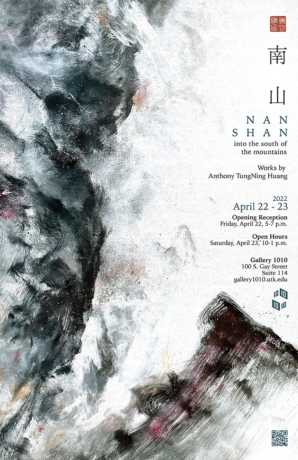
Exhibitions
NANSHAN 南山
Gallery 1010 (UTK) / 100 South Gay St., Suite 114 April 22, 2022 - April 23, 2022
Anthony Huang
We who live in cities will always forget that the natural world is full of information and small gifts. In Western culture, people believe that human beings are born from the garden, and in Eastern myth, humans are born from the soil—ashes to ashes and dust to dust. We take nature and are born in nature; we seek inspiration from nature, we feel sad and indignant from the change of nature.
The animals and plants living in the wilderness seem to have wonderful sights, but also there's the law of the jungle. Moreover, in the contemporary social environment, environmental protection, pollution, and sustainable development make human beings have different feelings about nature. But, on the other hand, the relationship between human beings and things in the world is closely related to nature. So what is the difference between the wilderness and the metropolis life of our human society?
With the theme of " Nan Shan 南山 ," this exhibition will mainly display the print works by Anthony TungNing Huang, an MFA printmaking student in UTK. All content will involve natural themes, and all works in this exhibition have been completed. There will be 8 prints in the show and also an installation that can lead audience enter to a peaceful world.
In Chinese, Nan Shan means "the south of the mountain." This word comes from the poem "Drinking" by Tao Yuanming, a poet from Wei and Jin dynasties, "Gathering chrysanthemums by the eastern fence, I gaze leisurely at the southern mountains." In troubled times, the author wants to find peace of mind through the mountains and rivers.
Nature is an inexhaustible source of inspiration for ancient Chinese artists. They chanted natural scenery and understood the relationship between human beings and nature. They transformed their emotions and personality into nature. They created objective beauty, a rich soul, and natural humanity.
In the creative process of communicating with nature, the artist can feel the relationship between himself and nature. You can also express your own emotions through nature—the majesty of the mountains and the waves of the sea. The process of truly appreciating nature is not centered on the appreciator but nature.
The process of appreciating nature is not centered on the appreciator but nature. Therefore, human appreciation of nature is the conversion process to nature, life, and the magnificent world.

